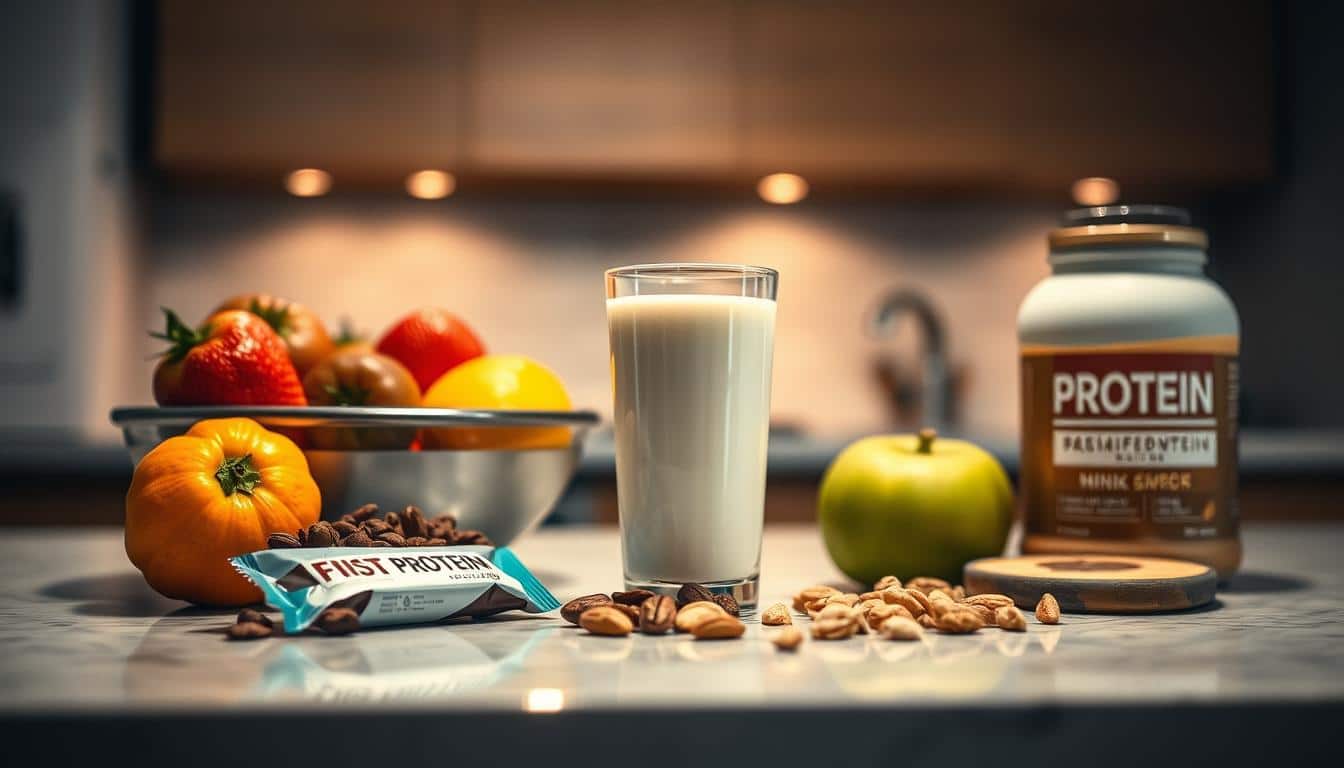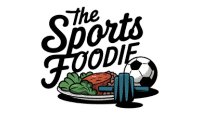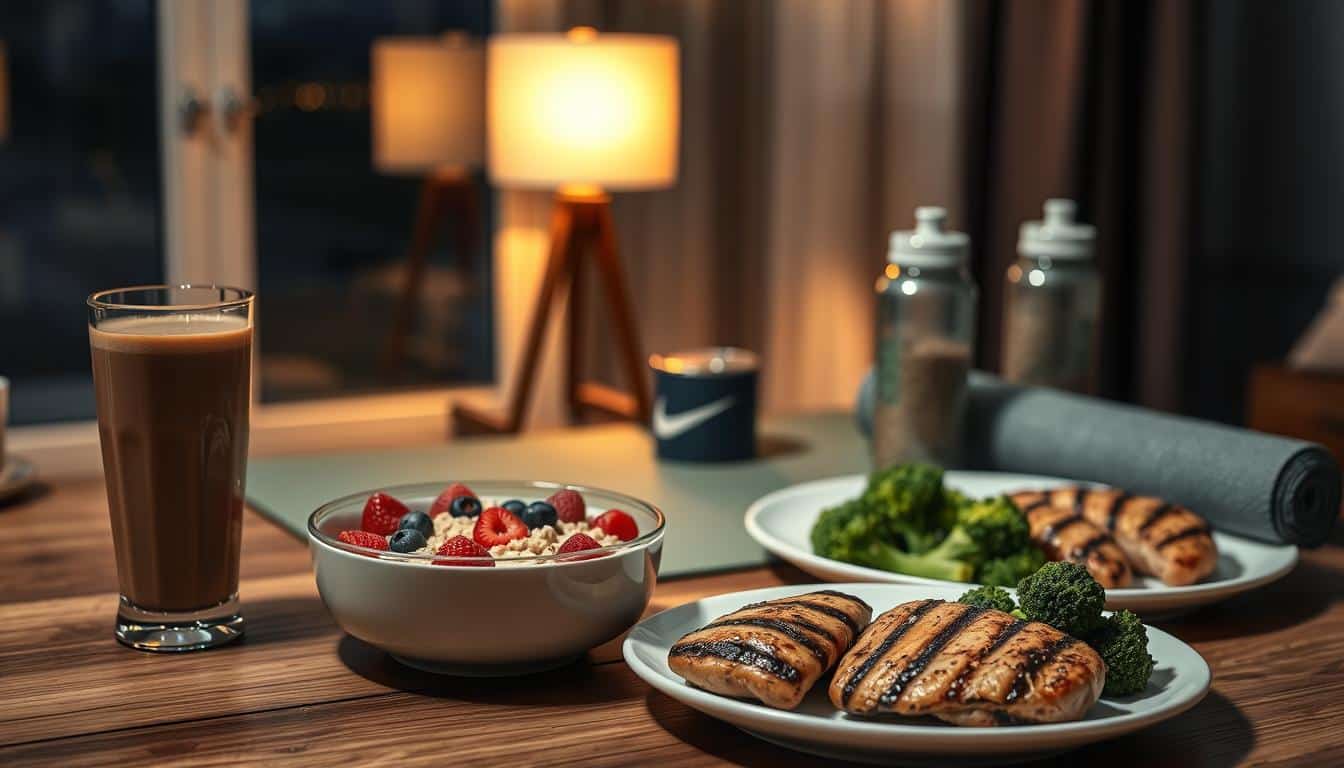You’re dripping sweat after crushing a late-night session, stomach growling as you glance at the clock. Your body deserves more than random snacks – it needs strategic nourishment that supports recovery without wrecking your sleep. The right meal combo can transform how you feel tomorrow while keeping your fitness progress on track.
Timing matters when refueling after nighttime exercise. Muscle repair peaks during rest, making your evening meal a key player in achieving results. Balanced plates with protein, complex carbs, and healthy fats help regulate energy levels and promote better recovery.
We’ll show you how to pair foods that satisfy hunger and support your body’s natural processes. Discover which ingredients boost muscle synthesis while preparing your system for quality rest. You’ll learn why certain nutrients matter more when exercising later in the day – and how simple swaps can align your eating habits with your health objectives.
Understanding Post-Workout Nutrition at Night
Your body enters a unique recovery phase following evening exercise. Nighttime refueling requires smart choices that balance muscle repair with rest preparation. Getting this right helps maximize gains while supporting natural recovery cycles.

Role of Macronutrients in Recovery
Protein delivers amino acids that rebuild exercise-stressed muscle fibers. Think of it as construction material patching microscopic tears from your workout. A 20-30g serving helps kickstart repair processes while you sleep.
Carbohydrates refill energy stores drained during physical activity. They also help shuttle nutrients into muscles more efficiently. Opt for complex carbs like oats or sweet potatoes – they digest slowly without spiking blood sugar.
Healthy fats maintain hormone balance and keep hunger at bay. Avocado or nuts add staying power to meals, preventing midnight snack cravings that disrupt sleep quality.
Evening Benefits of Proper Nutrition
Nighttime meals impact next-day performance more than you might realize. Proper nutrient timing enhances muscle synthesis during deep sleep phases. This means better recovery before your morning alarm rings.
Balanced evening nutrition also stabilizes blood sugar levels. Steady energy release prevents restless nights while supporting cellular repair. You’ll wake refreshed instead of reaching for that second coffee.
Remember: Your body absorbs nutrients best within 45 minutes post-workout. Capitalize on this window even during late sessions – it’s prime time for fueling progress.
What to Eat After Late Workout
Your post-exercise meal becomes critical when workouts happen closer to bedtime. Focus on easy-to-digest options that deliver nutrients without overwhelming your system. This approach supports muscle recovery while helping you wind down for restful sleep.

Research confirms refueling within 4-6 hours before sleep maximizes repair processes. Your body uses this window to rebuild tissues and restore energy. Prioritize foods combining protein and complex carbs – they work synergistically to enhance recovery results.
| Food | Benefits | Best Time |
|---|---|---|
| Greek yogurt + berries | Fast-absorbing protein + antioxidants | Within 45 minutes post-session |
| Sweet potato + turkey | Sustained energy + amino acids | 2 hours before bed |
| Almond butter + banana | Healthy fats + natural sugars | Late-night snack option |
Portion control matters at night – overeating can disrupt sleep quality. Stick to palm-sized protein portions and fist-sized carb servings. These measurements provide adequate fuel without overtaxing digestion.
Hydration plays a key role too. Add electrolytes to water if you’ve sweated heavily. Proper fluid balance aids nutrient transport and prevents midnight thirst interruptions.
Key Macronutrients for Recovery
Your muscles need specific nutrients to bounce back stronger after evening training. Three power players drive this process: protein rebuilds tissue, carbohydrates refuel energy, and fats sustain long-term vitality. Let’s break down their roles.
Protein: The Muscle Mechanic
Protein delivers amino acids that patch exercise-induced microtears. Each gram packs 4 calories, acting like building blocks for lean tissue. Opt for quick-digesting sources like whey or slow-release casein before bed. A 20-30g serving meets most body needs without overwhelming digestion.
Carbohydrates: Energy’s Best Friend
Carbs restore glycogen stores – your muscles’ primary energy source. Simple sugars replenish fast, while complex options like quinoa stabilize blood sugar. Balance both types to power recovery and prep for tomorrow’s session. Remember: 4 calories per gram make carbs efficient fuel.
Fats: The Unsung Hero
Healthy fats supply 9 calories per gram and support hormone balance. Avocados and nuts provide fatty acids that curb hunger and sustain energy. They help your body absorb nutrients while keeping midnight snack attacks at bay.
- Pair salmon with brown rice for balanced recovery
- Choose almond butter on apple slices for sustained energy
- Mix Greek yogurt with oats to combine all three macros
Timing matters. Consume protein within 45 minutes post-workout, then add carbs and fats. This combo maximizes muscle repair while aligning with your body’s natural recovery rhythm.
Top Food Options for Muscle Repair
Smart food choices become your secret weapon when rebuilding tissue after evening training. These nutrient-packed options deliver exactly what your body needs to repair and strengthen – without compromising sleep quality.
Greek Yogurt, Cottage Cheese, and Eggs
Greek yogurt packs double benefits – 20g protein per cup plus gut-friendly probiotics. This combo helps your muscles recover while keeping digestion smooth. Mix in some berries for antioxidants that fight exercise-induced stress.
Cottage cheese offers slow-digesting casein protein perfect for overnight recovery. Its low carb content prevents blood sugar spikes, making it ideal for late-night refueling. Try it with cinnamon for flavor without added sugar.
Eggs provide all nine essential amino acids needed for tissue repair. Their versatility makes them easy to prepare – hard-boiled versions stay fresh for quick post-workout snacks. Each egg delivers 6g of complete protein your muscles crave.
Lean Meats and Fatty Fish
Chicken breast gives you 25g lean protein per 3oz serving – perfect for building strength without excess calories. Pair it with roasted veggies for a recovery-boosting meal that satisfies hunger.
Salmon stands out with its omega-3 fatty acids that reduce inflammation. These healthy fats work with high-quality protein to speed up repair processes. Grill a fillet with lemon for a light yet powerful recovery dinner.
- Combine Greek yogurt with chia seeds for extra fiber
- Top cottage cheese with walnuts for crunch and healthy fats
- Use leftover salmon in morning omelets for continued benefits
Healthy Late-Night Snack Ideas
The clock ticks past 10 PM as you finish your final rep. Smart snack choices now support your body without disrupting rest. Focus on combinations that deliver nutrients while keeping digestion smooth.
Hummus shines as a recovery ally. Made from protein-rich chickpeas, it pairs perfectly with veggie sticks or whole-grain crackers. This combo offers fiber for steady energy and minerals like magnesium to ease muscle tension.
Roasted chickpeas make crunchy, satisfying bites. Toss them with olive oil and paprika before baking for flavor-packed crunch. They’re portable, shelf-stable, and deliver plant-based protein that keeps hunger at bay.
| Snack | Key Benefits | Portion Tip |
|---|---|---|
| Almonds + dark chocolate | Healthy fats + antioxidants | 15 almonds + 1 square |
| Greek yogurt + chia seeds | Probiotics + omega-3s | 1/2 cup yogurt + 1 tsp seeds |
| Apple + peanut butter | Fiber + sustained energy | 1 medium apple + 1 tbsp |
Nuts and seeds offer quick solutions when time’s tight. A small handful of walnuts provides omega-3s to reduce inflammation. Pumpkin seeds add zinc for immune support – crucial after intense sessions.
Keep portions palm-sized to avoid feeling stuffed. These snacks balance taste and function, helping you wake up refreshed and ready for tomorrow’s challenges.
Combining Foods for Optimal Recovery
The right food pairings can turn your evening refuel into a recovery powerhouse. Smart combinations deliver synergistic benefits – helping your body repair tissues while preparing for restful sleep. Let’s explore how to build plates that work harder for your goals.
Balanced Snack Combinations
Pair almond butter with whole-grain toast for a winning mix of healthy fats and complex carbs. This duo stabilizes energy levels while providing sustained fuel. The protein helps rebuild muscle fibers, while fiber keeps digestion smooth.
Try Greek yogurt topped with sliced peaches and chia seeds. You’ll get fast-acting protein plus slow-digesting carbs – perfect for overnight repair. This combo also supplies calcium for muscle function.
Meal Pairing Suggestions
Grilled chicken breast paired with roasted sweet potatoes creates a muscle-friendly dinner. The lean protein supports tissue repair, while the complex carbs replenish glycogen stores. Add steamed broccoli for extra vitamins.
For plant-based options, combine quinoa with black beans and avocado. This trio delivers complete protein, healthy fats, and magnesium – crucial for relaxation. Discover more muscle repair foods that fit your dietary preferences.
Remember: Balance flavors and textures to keep meals satisfying. A handful of walnuts adds crunch to soft cottage cheese, while berries brighten savory egg dishes. These thoughtful pairings make nutrition feel effortless – not like a chore.
Benefits of Protein and Complex Carbohydrates
When your evening training wraps up, your body’s repair crew clocks in. Protein and complex carbohydrates form the ultimate recovery team – one rebuilds tissue while the other refuels energy reserves. Research shows this combo enhances results better than either nutrient alone.
A 2020 study found bedtime snacks rich in protein with fewer carbs improved insulin sensitivity by 12% compared to carb-heavy options. Slow-digesting carbs like oats stabilize blood sugar levels overnight. This prevents energy crashes while replenishing glycogen stores – your muscles’ fuel tank for tomorrow’s efforts.
Here’s why this pairing works magic: Protein delivers amino acids that patch exercise-stressed muscle fibers as you sleep. Complex carbs extend this repair process by gradually releasing glucose. Together, they prevent midnight hunger pangs that disrupt restful recovery.
Smart combinations make this easy. Try a turkey slice on whole-grain bread or cottage cheese with pear slices. These meals provide sustained energy without spiking cortisol levels. You’ll wake up with muscles ready for action and energy that lasts through morning tasks.
Balance matters most. Aim for a 2:1 carb-to-protein ratio in evening recovery meals. This ratio supports muscle synthesis while maintaining steady glucose levels. Your body gets what it needs to rebuild stronger – without digestive discomfort stealing your sleep.
Managing Timing and Digestion After Night Workouts
The final rep is done, but your recovery strategy’s timing matters just as much as your meal choices. Proper spacing between exercise, fueling, and rest helps your body transition smoothly into repair mode. Let’s explore how to sync your evening routine with natural rhythms for better results.
Cooling Down Matters
Post-workout routines shouldn’t end when you leave the gym. Light stretches or breathing exercises help lower cortisol levels spiked by intense sessions. This cooling-down ritual signals your system to shift from “fight mode” to recovery.
Wait 15-20 minutes before eating. Your digestion works best when your heart rate returns to baseline. Hydrate with room-temperature water during this window – it aids nutrient absorption without shocking your stomach.
Smart Meal Timing
Heavy meals close to bedtime disrupt rest. Fried foods or spicy dishes take longer to process, keeping you awake. Opt for easily digestible options like oatmeal or steamed veggies if eating within 90 minutes of sleep.
Follow the 1-2-3 method: Allow 1 hour post-workout before meals, 2 hours between eating and lying down. This rhythm prevents acid reflux while letting nutrients fuel overnight repair. Your body gets what it needs without digestive battles.


